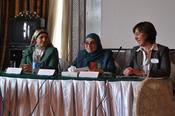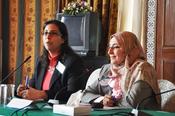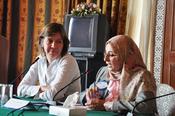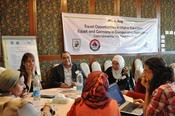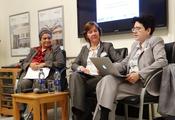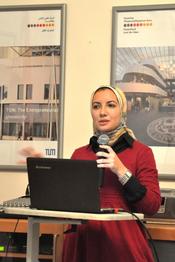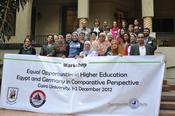Workshop "Equal Opportunities in Higher Education - Egypt and Germany in Comparative Perspective", Cairo, December 2012
From December 1 to 2, Freie Universität Berlin organized a workshop on Equal opportunities in higher education: Egypt and Germany in comparative perspective in Cairo in cooperation with the Egyptian Ministry of Higher Education and Cairo University. For two days, representatives from several Egyptian universities, the Egyptian Ministry of Higher Education, and Freie Universität Berlin discussed different strategies and policies to enhance equal opportunities in higher education and to support work-life balance at the university. The workshop was part of the projectGender equality in the Egyptian higher education system, a cooperation between Freie Universität Berlin, the universities of Cairo, Alexandria, Sohag, and South Valley, and the Strategic Planning Unit of the Egyptian Ministry of Higher Education. It is funded by the German Academic Exchange Service (DAAD) within the programme "Transformations Partnerships with Universities in Egypt and Tunesia".
Click here for the detailed programme of the workshop.
The workshop started with two keynote speeches of Prof. Dr. Heba Nassar, Vice President of Cairo University, and Dr. Mona Zulfikar, Partner at Zulfikar & Partner Law Firm and Vice President of Advisory Committee to the UN Human Rights Council. Prof. Heba Nassar analysed the gender segmentation of the Egyptian labour market, while Dr. Mona Zulfikar addressed challanges to gender equality under the new draft constitution.
The following session analysed and compared the current situation regarding gender balance at Egyptian universities as well as at Freie Universität Berlin on the basis of statistical data analyses currently being conducted at the universities that participate in the project. The presentations showed that in Egypt, females are underrepresented in leading positions in most specialities but at the same time numbers of female faculty members increase at a much faster rate than males - this partly due to the fact that the educational sector is less attractive and prestigious for men than for women. It remains to be seen how the latest salary increase of university staff effects this trend. To gain a deeper insight in the situation at Egyptian universities, the Strategic Planning Unit (SPU) of the Ministry of Higher Education developed a survey which is currently distributed among faculty members and will be analysed by SPU staff.
In five working groups representatives of the different universities discussed crucial problems that especially female scientists and university graduates face during their career and assessed different strategies and policies to enhance equal opportunities for all university members.The working groups, dealing with topics like family support, dual career couples, career development, and research funding, formulated recommendations for concrete measures and developed a vision towards a more equal and family friendly university.
To name some examples, the working groups brought out that women faculty staff, like all Egyptian women, mainly suffer from the poor services in Egyptian society (e.g. preschool child care, children education, transportation, home help, child health care etc). To meet the requirements of faculty with families, not only infrastructure (nurseries, emergency child care etc.) and more flexible working conditions are needed but also regulatory laws that encourage both parents to share family duties. Especially for couples who both pursue an academic or professional career (so-called dual career couples), laws that allow mobility between universities are important to enable the couple to lead a common family life. Since it is in most cases almost impossible to relocate the family home due to financial and social constraints, usually one partner commutes to the workplace, whilst the other partner continues to work near the family home. If one of the partners gets an opportunity to work or study abroad, the law gives the other partner the possibility to take a vacation to keep the family together.
Moreover, problems with regard to the development of an academic or professional career were identified: Both male and female faculty staff equally face problems due to the fact they are not fully trained to become researchers. Therefore, soft skills training like proposal writing as well as training in research strategies is needed, and research facilities including access to software/hardware and electronic libraries have to be provided. Currently, research is mainly self funded in Egypt (i.e. funded by the researcher), however, STDF offers funding to outstanding research projects with the help of international organizations like DAAD. Especially young female researchers need more structured information about these research funding options and publishing.
Young graduates also face problems with finding a job outside science, since universities do not equip them with the necessary attitudes and skills. Both male and female graduates lack soft skills like time management, and leadership and management skills, and therefore do not meet the requirements of the labour market. Informal networks are in many cases not accessible to young graduates, especially females. Mentoring programmes could therefore be helpful to encourage and support young graduates to pursue a professional career career and help them find a job.
At the end of the workshop, the participating universities developed action plans tailored to the needs and the specific situation at each university. Within the framework of the project, an office concerned with enhancing equal opportunities will be established at each university. The scope of the offices varies and covers counseling with regard to career development and combining work and family duties, networking with stakeholders, providing information, and helping establish necessary infrastructure like nurseries and kindergartens.
The outcomes of the workshop lay the groundwork for a successful continuation of the project in 2013.


